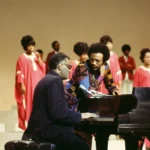How Sarah Lapyilnaan Dafaan is coaching the next generation through Elpizo Restore Foundation

Today’s #NAHWC tells the story of a young woman passionate for youth and teenagers who believes the way to make them good adults is (to borrow words from the bible) to train them in the way they should grow. Sarah Laapyilnaan Dafaan founded Elpizo Restore Foundation and set on a mission to train the younger generation up.
Sarauta Magazines Nenkinan Nehemiah Deshi interviewed Sarah Laapyilnaan Dafaan and the fruit of that interview is presented below. Enjoy the read.
Hello Sarah. Please tell us a bit about yourself.
My name is Sarah Laapyilnaan Dafaan. I am 22 years old, a proud Nigerian from Quanpan local government in Plateau State; I am currently a final year student of law at the prestigious University of Jos. I am most passionate about teenagers and seeing them live purpose-conscious lives and also participating in community and nation development. I am an entrepreneur – I make confectionaries. I also run a non-governmental organization (Elpizo restore foundation), which focuses on raising a new stock of leaders in Nigeria and Africa as a whole, as well as meeting the needs of victims of war and crisis the best we can.
What prompted you to start Elpizo Restore Foundation?
I saw a need in my society and I felt I could do something about it. Growing up in a state like my state of Origin and residence – Plateau State – I saw a large number of teens on drugs, pregnant or just getting up to some form of mischief or the other detrimental to their lives and well-being and another section of victims of war or unrest.
This did something to my mind (and it should to everyone’s) and it led me to be torn between believing that chaos and irresponsibility were normal and they being abnormal. However, my parents are very pro-responsibility, so I learnt early on to take responsibility for my actions and those of others I could do something about.
Also, my mum runs an NGO that deals with widows and orphans so I grew up watching her give constantly to make other people live better lives and she always encouraged me to help. So I’d follow her to programs, to orphanages, follow her to seminars she organized, help arrange the clothes for the orphans, sort out food for the widows and things like that and I realized along the way that I wanted to be a catalyst that would change the way people think and behave.
Teenagers are often associated with reckless and careless behaviour, and I don’t believe that simply because you’re a teenager you should be reckless and careless, you can choose to be a leader, you can choose to make an impact, you can choose to do better and I’m trying to contribute my quota to see that teenagers do that; that they are responsible, purposeful and dependable members of society who are making an impact from their corners.
Also, growing up in a place and time where crisis and unrest were common, I believe you’d naturally have empathy towards the plight of those who are victims of such unrest, which is what happened to me. I personally believe that the effects of war or crisis are wide and far-reaching, and it goes beyond merely the physical damage, it affects the mind, leaving its victims with abused mind-sets, which if not cared for and corrected would result in a generation of toxic adults who will do more harm than good. So I try to meet their immediate physical needs best I can, but more importantly work on correcting their mindsets.
Generally, I believe my immediate society and what I saw around me influenced and made me so passionate until Elpizo was birthed.

What exactly does Elpizo Restore Foundation do?
Elpizo Restore Foundation is a non-governmental organization that deals with teenagers in general and victims of war/crisis, we seek to create leaders out of as many teenagers as we can, as well as alleviate the effects of war on children. We organize programs that promote and enhance leadership skill development, we provide educational and financial support to young people, we organize training on non-academic skills, medical outreaches to ravaged communities, and we partner and collaborate with other organizations with similar goals and passions. We also provide opportunities for young people who want to give back to their society by allowing them to volunteer with us.
What is the mode of operation of the Foundation? And how has the journey so far been?
The journey so far has been beautiful, it has been amazing. Sometimes it’s scary, discouraging and very difficult too, but we’ve learnt to push through. Over the years, I have learnt a great deal, my vision is clearer, I have gleaned knowledge and met so many amazing people. The best part of this journey is that I have been able to make an impact. I have been fortunate enough to pour out my heart, and inspire teens with my personal story, and that has really been beautiful. There have however been days when I wanted to give up because I was overwhelmed or afraid, but passion like Prophet Jeremiah (Jer. 20:9) said, is like fire shut up in my bones, I can’t let it out, so it keeps me going.
I’m thrilled at the work you do – trying to inspire a generation. How much job do you think has to be done on the next generation?
A lot. There is a lot of work that needs to be done for the next generation. Preparation is key to everything, if we don’t prepare our teens to lead and take over industries and all, life will just happen to them and they will merely be spectators, wondering where all the time and opportunities went to. The world is advancing so rapidly that it’s easy for them to get lost in all of it, but we need to put great effort into them becoming well-rounded individuals, else corruption will continue to be on the increase, crime rates will continue to increase, suicide will be even more rampant and wars will never end. So there’s a lot of work, we need to be serious about training them and they need to be prepared for the world, the teens are not just the leaders of tomorrow, they are also the leaders of today because tomorrow is already upon us.
What are the challenges you’ve noted teenagers face? Social Wise especially.
The teenage years are very traumatic, I remember when I was a teen I couldn’t wait to stop being a teen (lol), because I was lost most of the time. Some issues I’ve noticed from working with teens and being one myself are;
- Self-esteem
- Depression
- Stress
- Underage Sex
- Drug and Substance Abuse and addiction
- Cyber Addiction
- Bullying, amongst others.
In our country, there is a tendency to look at the things these teenagers are passing through and call them normal, claiming we’ve all been there so it’s nothing new. Although some work has been done to raise awareness on some of these issues and to take them seriously, more work still needs to be done.
The most focal of all these issues to me is that of self -esteem. So many of our teens have acutely low self -esteem, because society, the media, friends, church all tell you how to look and be, and somehow it automatically translates to them that if they’re not meeting up to these standards there’s something wrong with them. It’s a lack of self -esteem that breeds some if not most of the other challenges we are faced with as regards our teens, constantly looking for validation from things and other people and when they don’t get it they obviously resort to the next available thing; drugs, alcohol, sex, social media, etc. and ultimately depression.
These are real problems that need real solutions and they cannot and should not be swept under the carpet. I also find it incredibly important to state that TEENAGERS ARE STRESSED. They have a hard life to deal with, finding your place, knowing their worth, it will be hard on anybody – now combine that with all the hormonal and emotional changes – they are bound to be scared and stressed. I think people need to understand this and not underplay it, because stress can lead to a mental break down and depression.
A survey carried out stated that about 11 per cent of adolescents have a depressive disorder by age 18. Teens are facing real challenges but I believe that with the right approach, some of these ‘’challenges’’ can be channelled and turned into something good.

What have the challenges to your work been?
There have been a number of challenges oh. But one of the major issues is funding. Most of our programs require funding to execute and a lot of individuals and organizations aren’t really ready to give, most especially because we’re a young organization and a lot of people don’t know us or what we do just yet. Hence there is a lot of distrust and uncertainty when it comes to releasing funds to support a brand you barely know. As a result, I’m left with the option of funding almost all of the projects, and sometimes depending on contributions from family and friends to fund the projects.
Another challenge to be honest is one of inexperience, some things can never be “learnt�? from reading or even observing, they can only be experienced. Before starting the NGO I read a number of books and even now I’m constantly trying to read and ask questions, so in some way, I thought I was prepared. But by the time I actually got out and started working, I met all types of lions, tigers and bears and sometimes no book would prepare you for that, so there have been a lot of moments where I was simply “ripping and running�?.
Why did you choose to do the work you do at Elpizo Restore Foundation and how much do you think lack of proper teenager coaching is?
I saw a need in my society and I became passionate about meeting that need. As far as teenage coaching goes, here in Nigeria, emphasis is not laid on teenage coaching, but it’s actually very important and necessary. I know most schools have guidance counsellors, who try to breach the gap even though it’s not quite the same. Teen coaching goes beyond merely telling them what subjects to offer, it is much deeper and even harder. But it is worth it, we cannot afford any longer to allow our teens to wander without clear directions, with conflicting and confusing emotions, without a sense of responsibility.
It has become absolutely necessary that they be coached and guided, not by barking orders at them but by going on this journey together with them. There is truly a big gulf between where we ought to be and in fact need to be, and where we are as regards our teens.
What do you think Parents, churches and schools can do to abridge these problems?
My advice to every parent I meet is simple, LISTEN. Listen to that child, most times parents are in a hurry to dish out advice, to get to work, to just move but take out the time and listen, build a friendship with your child, that’s the only way that child would trust you enough to actually talk to you about what he/she is going through. Building friendships with your teenage child is the only way you’ll actually get to be a part of their world and help them get through this phase. So for the parents, it’s simple, LISTEN.
Churches need to build a community where these teens can let go, relax and be real. Not all this religion we keep forcing down their throats. We need to learn to allow them to be real about their problems and often create a community that allows them to function effectively and uniquely.
Schools, hmmm, well it’s actually at school most of the ‘’wahala’’ happens, from bullying to insecurities. Our educational sector needs a revamp, it can’t be just books and books and books we keep teaching at schools but basic life skills also. They need to be taught how to manoeuvre through their teenage years, how to be kind to each other, things that are sadly not taught in schools now, but definitely need to be taught. I’m not much of an educator, but I do know that it is extremely necessary that our schools get involved.
The church, schools and parents (home) have a BIG role to play honestly because most of these problems they face either start from one of these three places or are manifested in one of them.
What is your vision for Elpizo Restore Foundation? What goals do you have and what programs are we looking forward to?
The vision of Elpizo Restore Foundation is to be a catalyst of change that will restore children and young adults back to Gods original plan for their lives raising excellent leaders out of them who will contribute their part in community and nation-building. We have a number of programs for the year; a medical outreach to an IDP camp, a skill acquisition training for teens, amongst others. The most foremost of all of these is our Pinky Promise Project in February, for Ladies from 17-19, it’s what we’re currently working on right now. So we have a lot penned out as far as programs go.
What advice would you give to young Nigerians out there?
Everyone has something to give. Stop complaining and start doing. Talk they say is cheap. We as youths need to learn to start acting and changing the world from our small corners, making an impact within our small circles. We might not be able to change the world immediately, but with the right attitude, we will be able to change it eventually. And if you can’t initiate or start something, there are a lot of great organizations that you can volunteer with.
The point is, you will get more fulfilment in putting your heart and energy into making a difference than you would complain. It’s okay to start small, but start and start now, the time to act is now.
How can people who read this post contribute to your project?
By volunteering, we always need more hands, the work is enormous and one person can’t do it alone. Of course, financial or material donations are also appreciated.
How can we contact you?
Email: Laapyil.ld@gmail.com/Elpizo001@gmail.com
Instagram: Elpizo001
Facebook: Elpizo Restore Foundation
Contact Number: 08138911438 or 09032734577
Sarah has raised quite a legitimate number of concerns about teenagers and their development. I’d like to encourage everyone reading to pay special attention to the teenagers around them be it siblings, children, cousins, nephews and nieces, church members, students, etc. because the future success of our world depends on how they are groomed.
Thank you for reading and watch out for more stories of Heroes Who Wear Capes.






